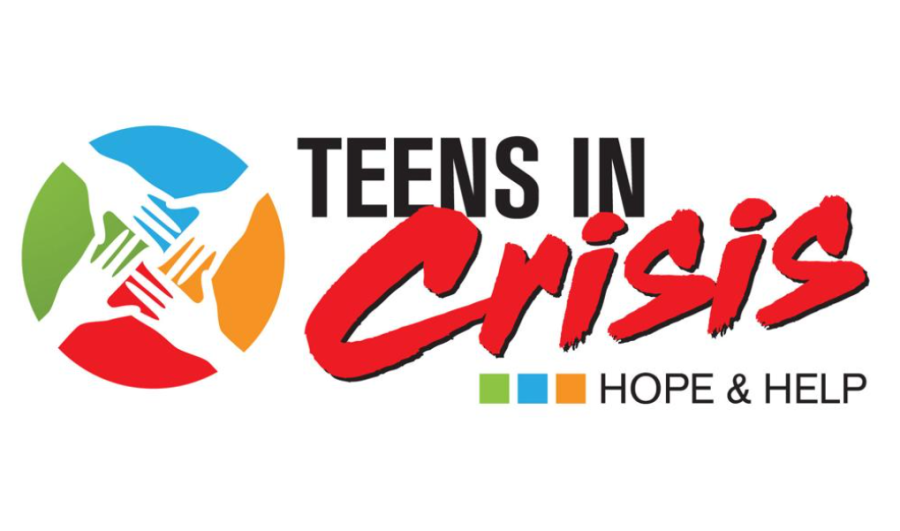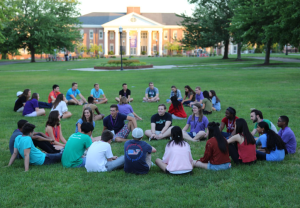Teens Talk About Mental Health
Courtesy of the Johnson City Press
Teens in Crisis series cover
March 12, 2023
Mental health. To John, it’s the way someone perceives the world. It reminds him of colors tied to emotions; sadness as gray and anger as blue.
Noah takes a more clinical approach to his definition; “Psychological and emotional thoughts,” he tells me.
Jane uses more general terms. “It’s a sense of well-being in one’s life. You like who you are, or at least who you are trying to be.”
When I ask Josh to define mental health, he ponders the question for a bit. “There’s no correct way to be absolutely mentally healthy, like you could physically,” he starts. “But, in general, it’s accepting who you are and then being okay with it.”
Erica, sitting close by, nods emphatically. “So true, bestie.”
Everyone defines mental health a bit differently, but themes of acceptance and balance are common when we think of “good” mental health. And yet, as a society, we are collectively finding these things often lacking in the everyday lives of teens. The ongoing teen mental health crisis makes it all the more important for us to hear real voices, read true stories, and speak out about our struggles.
High schoolers are far too familiar with the layers of stress that pile up throughout the year. Josh, snorting, compares his stress to an onion. “There are surface level stressors, and then there are ones that are so far inside, you don’t realize they’re stressors until you’re crying in the shower at 4am.”
It might seem like a far-fetched metaphor, but the sentiment is common. “I definitely feel layers upon layers of academic and social stress accumulating throughout the day,” says Alex. “There’s just not ever a time to release it.”
School
“What are your stressors?” I ask this question in all my interviews, knowing already that the list will be long.
Strangers, B’s, expectations. Expectations, and more expectations. Keeping grades up, getting into college, fear of losing sports matches. Impulsivity. Choosing a career path early on, lack of motivation, parents. Social anxiety, ADHD, depression. Body, acne, clothes. Insecurity, personality. Loneliness.
“Life, just all of it,” says Jack.
The list trails on and on. It’s an unmanageable torrent of things, big and small, emotions and stimuli, situations and people. Erica helps me break it down.
“First,” she says, “is academics. I feel like I need to be everything all the time. Being smart is half my identity, so if I’m not smart and not good at academics then who am I? I just have to be the best. I get a C on one test and I feel like a worthless human being.”
Josh, sitting beside her, concurs. “Honestly, the necessity to perform isn’t futuristic, it’s just personal comfort at this point. I feel weird and awful if I don’t do good.”
For Erica and Josh, it’s mostly internal. But parents are also a big influence in terms of expectations for success. “My parents are immigrants from a poor country, so they understandably have very high expectations in all aspects of my life, especially my career path,” Lexi says.
Alex has a similar experience. “The pressure from my parents to be perfect all the time can be too much to handle. I’m constantly compared to other kids, to other success stories. It hurts.”
And yet, these same teens don’t dislike learning. “I’ve always found interest in everything,” Sam says, throwing up his hands. “I truly like learning. I’m just stifled by the structure.”
Sam isn’t the only one. Classmate after classmate I talk to expresses the same desire to learn, but many struggle with motivation and passion. “As high school progresses, I’m finding it harder to love learning. Last year I was so engaged, but now I’m just burnt out a lot,” Emma tells me.
Throughout my discussions with students who concern themselves deeply with academics, there is a looming character in the room: college applications. The commonly accepted message is that, to apply for a selective school, students must demonstrate their passion for a specific subject. A spike, so to say, that their academics and extracurriculars point too.
“I’m definitely pressured to choose a career path earlier on. There’s the college app thing; everything you do needs to contribute to your spike,” explains Mia. “I want to be able to explore and take various classes to see what’s right for me but I also feel this pressure to decide, now.”
Acceptance
Next, the conversation often turns to social stressors. For most of the teens I talked to, their mental health is deeply shaped by identity and a struggle for acceptance. John speaks about his experiences as a transgender man.
“Being trans has definitely given me my fair share of breakdowns, but I would not be the person I am if I weren’t [out]. In the past, I was ignorantly homophobic, but realizing I was trans and bringing myself into those communities has helped me overcome most, if not all, of that internalized homophobia.”
While John tells me that he’s mostly found self-acceptance, Josh’s experiences with his sexuality are nowhere near resolved.
“My parents come from a very old identity with old beliefs and conservative values. Culturally, I have to care because I will get called out and embarrassed if I don’t. I feel like my parents are embarrassed of who I am, but I’m terrified of being an outcast. I don’t want to cut myself off, but I’m afraid that it will happen.”
Erica provides another nuance. “My direct family is very accepting,” she says, “but I was raised in a very religious culture in the church. The thought of being gay… well, there were certain friends I was afraid to come out to.”
The Pandemic
All the teens I talked to were deeply affected in one way or another by the pandemic. What surprised me was the degree of nuance they were able to find in their experiences. The bad was patently obvious.
“Many of us were away from our peers and support groups. If someone’s home life wasn’t great, the pandemic probably sucked.” Jane tells me.
“I felt lonely constantly,” says Mia, “and I developed social anxiety.”
Erica brings another perspective. “I felt okay at the time but in retrospect I was not doing great. I ended up with depression in the long run.”
John talks about the longer term consequences of isolation. “I know there’s experiences that I didn’t have. You see these people who are doing the most with their life now, and you think ‘That could have, should have been me.’”
Alex expresses a similar sentiment. “I definitely feel that I missed out on the high school experience,” he says. “I started everything so late, and now I’m not ready to be done.”
And yet, despite the grimness of the time, there was a common theme of positivity. “We had a lot of time to self-reflect, and we all changed as people,” Emma tells me.
“It gave me time to be true to myself,” says John. “I came out as a trans man near the beginning and not many people had to see my awkward phases.”
“I was anxious and depressed, yes, but I was also discovering new hobbies and amazing new communities online. I was rough, but I wouldn’t have had it any other way,” Alex says.
Social Media
Likewise, these teens brought a diverse array of views about social media to the table. Many were quick to point out the positives. “The side of TikTok I’m on, nobody is trying to make you feel bad. It’s people telling stories and connecting,” says Mia. “Honestly, social media has had a mainly positive impact on my mental health,” says John. “It’s helped me find people who struggle with the same things I do, and I post pictures of my art.”
Others had largely negative experiences. “The internet is basically throwing people’s perfect lives at you and sometimes you feel like yours isn’t enough,” says Jane.
“I saw these influencers, these beautiful skinny people, and I thought; I need to be them, so I stopped eating. I lost 20 pounds in a year,” says Josh.
“There is a direct correlation between me getting TikTok and me feeling depressed. Generally, our generation as a whole doesn’t have as good mental health as older generations, and there has to be a reason for that,” Erica tells me.
Suicide and Self-Harm
In some teens’ cases, their personal struggles drove them to dark places. Everyone who I talked to had either struggled with self-harm or suicidal thoughts or knew someone who had. Here are some of their words on the subject:
I have had suicidal thoughts, but I never actually did anything. I just thought about it, you know? How would people react if I were gone?
I’ve definitely had moments where I thought, ‘What if I didn’t have to do this anymore?’
I used to scratch at my arm to self harm, but I’ve been clean of that ever since I got out of the hospital. I still struggle with skin picking, but I’m working with my therapist and people around me to help me through that.
I know people who struggle with self harm. I don’t know how to help them and that hurts.
I don’t want to say the wrong thing; what if I make it worse?
There was an adult in my life who committed suicide. And I know they were driven to it, but at the time it felt almost… selfish. We were all just left here. You couldn’t have talked to someone? It sounds so terrible to say.
Breaking the Stigma
All the teens I talked to faced similar situations at home. Jane sums it up, saying, “My parents are very iffy about mental health; sometimes it’s hard for them to understand that my small problems are still important compared to other people’s big ones.”
Erica gives a specific example. “I once told my mom that I was depressed,” she says, “but she was just really doubtful about the whole thing. It really invalidated what I was going through.”
Josh’s experiences parallel those of Erica. “There was a period where I would try to tell them about stuff but they shunned it, they didn’t accept it,” he tells me.
John addresses the issue broadly. “There is a large stigma around a lot of mental health related things,” he tells me. “People don’t want to see the ugly side of it, the non-romanticized version. People don’t know how to respond when someone mentions self harm when they haven’t ever done it themself.”
That’s why stories like these are important. They’re ugly, non-romanticized, and real. They’re the voices of people you know, people you pass in the hallways at school, people who work at the grocery down the street.
I’d like to thank all the teens who contributed to this series for sharing these moments and emotions. The rawness in the deeply personal conversations of this series is something that breaks barriers and builds bridges. “Talking seriously about a topic like this is hard,” Alex says, “but it’s necessary. It brings us closer together and creates belonging. It gives us hope.”












